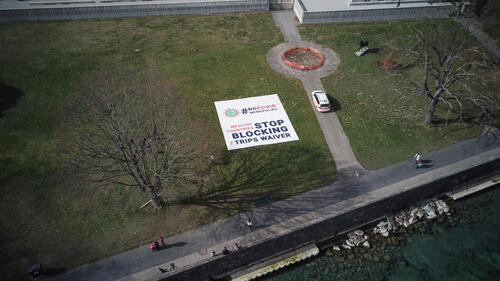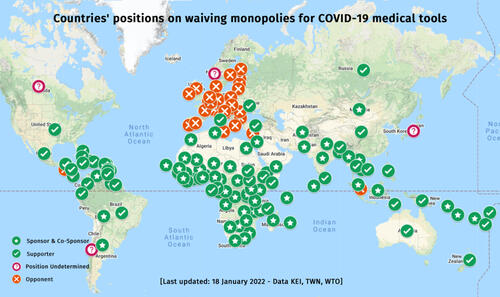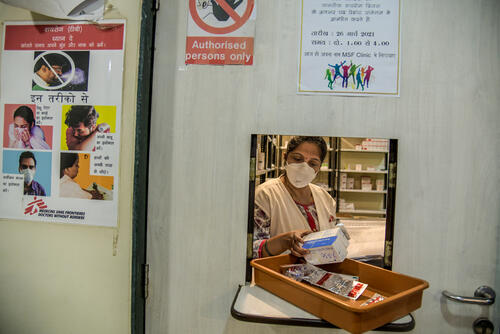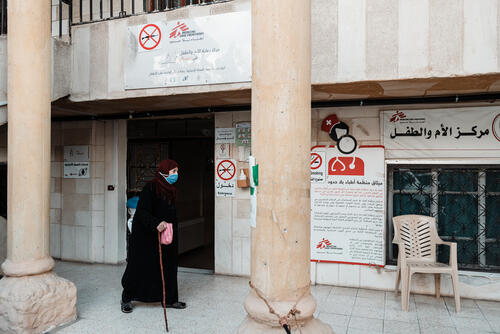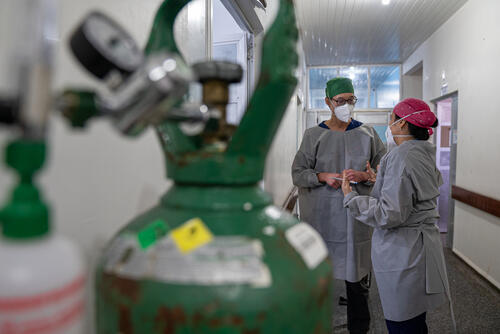- Ahead of talks at the WTO on patents on COVID-19 tools, a small number of countries continue to block a waiver that would open up access to these tools during the pandemic.
- Should the waiver be agreed, countries could produce COVID-19 vaccines and drugs on a larger scale, at lower prices.
- MSF urges these countries to immediately stop blocking the proposal to allow lives to be saved.
Geneva – As governments prepare to meet for another round of talks at the World Trade Organization (WTO), Médecins Sans Frontières (MSF) urged the small number of governments that continue to block a landmark waiver on intellectual property (IP) during the pandemic to immediately reverse their obstructive tactics and allow formal negotiations at the WTO to start.
The temporary waiver would apply to certain IP on COVID-19 medical tools and technologies until herd immunity is reached. It was originally proposed by India and South Africa in October 2020, and is now officially backed by 58 sponsoring governments, with around 100 countries supporting the proposal overall.
“Even after one year of this pandemic, and 2.5 million deaths, we still see certain governments denying that removing monopolies on COVID-19 medical tools will help increase people’s access to needed treatments, vaccines and tests going forward,” said Dr Christos Christou, MSF International President. “The waiver proposal offers all governments opportunities to take action for better collaboration in development, production and supply of COVID medical tools without being restricted by private industry’s interests and actions, and crucially would give governments all available tools to ensure global access.”
“Countries must stop obstructing and show the leadership required to deliver on the ‘global solidarity’ they have so often declared during this pandemic,” said Dr Christou. “It’s time to champion access to medical tools for everyone, wherever they live.”
With highly infectious new variants of the coronavirus spreading in many low- and middle-income countries, it is critical to ensure any existing and upcoming medical tools are accessible in sufficient quantities and in a timely way, especially for frontline health workers in developing countries, including MSF teams. If increasing the number of global suppliers of medical tools is not prioritised, people in these countries will remain in a disproportionately disadvantageous position for access. The proposed IP waiver could provide a more expedited and automatic policy option for governments at the international level to facilitate increased access, instead of only relying on voluntary measures by the pharmaceutical industry.
Enabled by IP monopolies, corporations continue to pursue secretive and limited commercial deals that exclude many low-and middle-income countries, even in the midst of the pandemic. The waiver proposal could help by removing legal uncertainties and risks for potential producers and governments to quickly start preparing to scale up production and supply of treatments, vaccines, and other essential medical tools.
In Brazil, where healthcare workers have struggled to provide care during multiple waves of the pandemic, our teams have witnessed how emerging waves saturated the existing health system resulting in rationing of medical equipment and interventions.
Countries must stop obstructing and show the leadership required to deliver on the ‘global solidarity’ they have so often declared during this pandemic.Dr Christos Christou, MSF International President
“From the early days in the pandemic when governments were competing to get access to certain diagnostics and protective equipment, it was clear that countries like Brazil and many others would be at the back of the line when it came to accessing scarce medical resources,” said Felipe de Carvalho, MSF’s Access Campaign Coordinator in Brazil. “Waiving monopolies will help level the playing field in this pandemic and ensure access for all.”
Despite the clear public health benefits that the monopoly waiver proposal offers, a small group of nations is rigorously hindering the start of formal negotiations at the WTO. At the same time, many of the countries blocking or delaying the proposal, including the Australia, Brazil, Canada, the EU, Japan, Norway, Switzerland, the UK and the US, have also secured the majority of available vaccines, much more than needed to vaccinate their entire populations.
“More and more low- and middle-income countries are getting very serious about making this pandemic monopoly waiver a reality, so it’s time for blocking countries to do the right thing and stop standing in the way,” said Yuanqiong Hu, Senior Legal and Policy Advisor at MSF’s Access Campaign. “Governments that oppose the monopoly waiver proposal know that simply asking pharmaceutical corporations to voluntarily do the right thing will not get us anywhere, when these attempts have so far failed to secure global access to COVID-19 medical tools for people who urgently need them. It’s time for change, not charity.”



